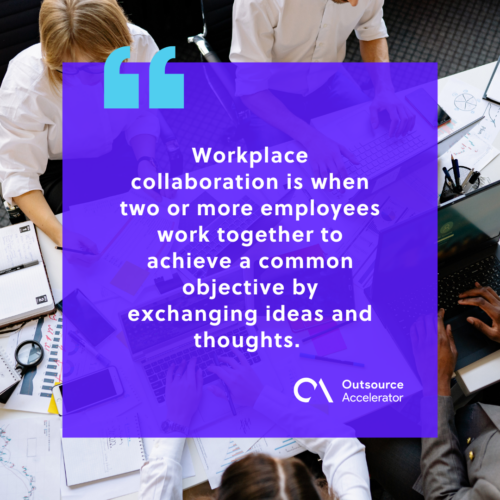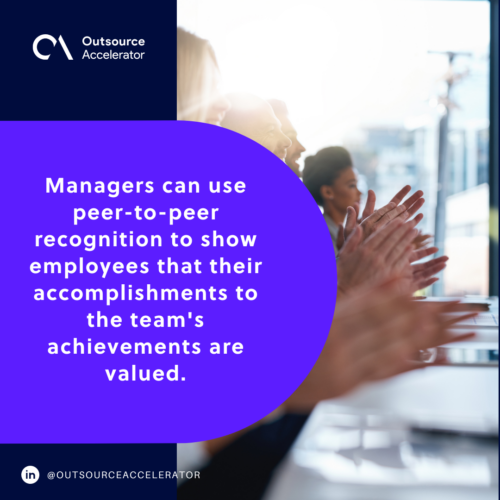How promoting workplace collaboration can further increase productivity

The more innovative a company is, the more successful it will be. Because of this, any company seeking to maximize the potential of its workforce by further promoting workplace collaboration.
However, bringing employees together costs time, money, and space. Collaboration has many advantages, however, it’s effects don’t happen overnight. This is why some businesses that try to enhance workplace collaboration give up before reaping its benefits.
This article provides insights and information about improving your workplace collaboration and productivity at work.
What is workplace collaboration?
Workplace collaboration is when two or more employees work together to achieve a common objective by exchanging ideas and thoughts. Collaboration in the workplace boosts employee productivity. It also gives them a sense of belonging to the company.
Workplace collaboration in an organization has a direct impact on its production and overall viability. It’s also easier to develop new ideas for solving an issue or completing a project on time.

Why is workplace collaboration essential?
Workplace collaboration tightens the connection of management to their employees. It uses the collective experience, knowledge, and talents of all those engaged when everyone works together to achieve a common goal.
Through collaboration, employees can display their abilities, competence, and talent from one another. Collaboration also has the added benefit of speeding up project completion times. Employees can pool their resources and combine their knowledge to finish the goal faster.
How do you improve workplace collaboration?
Increasing team collaboration in the workplace may not always be easy for businesses. Here are a few tips to help you better collaborate at work.
Team incentives and reward programs
Managers can use peer-to-peer recognition to show employees that their accomplishments to the team’s achievements are valued.
The management can provide incentives and rewards for team achievements instead of individual appreciation. Doing this will reduce internal rivalry so that employees do not view one another as competitors. Team incentives and reward programs will build trust and unity within the team.
Motivate employees
Leading by example is the most effective thing a leader can do to increase collaboration in the workplace. When engaging with employees, leaders should start adopting workplace collaboration platforms instead.
There are numerous advantages to having a highly engaged and motivated team, including lower absenteeism, improved employee retention, low staff turnover, and enhanced customer service.
Increase the range of work options
It’s human nature for your staff to seek out new challenges. When you set attainable goals for your team, you give them something to strive for.
Employee engagement solutions can be helpful for remote workers to boost productivity and morale. It increases the possibility that employees will collaborate to develop new ideas.

Use a company’s communication platform.
Having a communication platform can help employees form stronger bonds while efficiently exchanging information and expertise.
To help boost productivity and profitability, organizations have discovered that integrating or growing social networks can be an effective catalyst.
Implementing employee engagement programs
Implementing employee engagement programs improves workplace collaboration. When employees participate in a program, it unites them with a common goal and vision.
Employee engagement programs also encourage the growth of interpersonal relationships, making it easier for them to participate in group projects.
Important skills for workplace collaboration
When you have collaboration skills, you can successfully cooperate with others. Communication, active listening, and valuing diversity are just a few of the skills you’ll develop as a team member.
Here is a list of the vital work collaboration skills you’ll need to be more efficient:
Open-mindedness
Working well in a team means allowing for and embracing different perspectives. There will always be curious people in a company and people who are less open to new ideas because of their risks.
Curiosity and open-mindedness are the foundations of collaboration. Team leaders must find ways to foster these qualities in their workforces.
Good communication skills
Another requirement for a successful workplace collaboration is the ability to communicate clearly and thoughtfully. Everyone in a meeting must be able to communicate effectively with one another.

Emotional intelligence
One of the most looked at soft skills in the business is emotional intelligence. To be emotionally intelligent, one must be able to understand and control one’s own emotions.
Emotional intelligence was identified by 71% of recruiting managers as one of the most valuable soft skills. Workplaces with high levels of emotional intelligence have higher job satisfaction and productivity.
Organizational skills
If people can’t stay organized, the collaboration will fail. That’s why being organized is an essential collaboration skill. Abilities such as time management, planning, and project management require organizational skills.
Debate skills
The ability to argue your ideas with your coworker is another way to enhance workplace collaboration. Keep in mind that you have to argue sensitively and not negatively.
Debating is a great way to develop critical thinking. It develops analytical and research skills while teaching employees how to arrange and demonstrate their understanding.







 Independent
Independent




